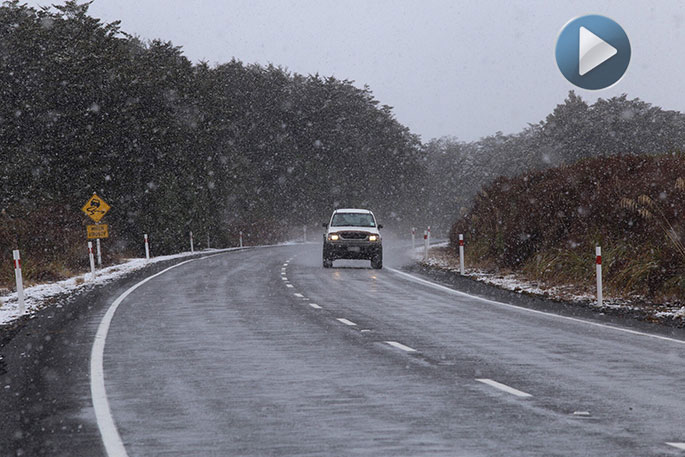Police will be hitting the roads in droves today as they launch a campaign aimed at drivers heading to and from ski fields around the country.
Operation Hotoke (winter) also focuses on the heightened risks on alpine roads during the ski season.
It will begin today at 4pm and run until 11pm on Tuesday, August 29.
Key risks associated with the campaign indicated people driving while fatigued or affected by alcohol, not wearing seatbelts, driving at unsafe speeds and failing to adjust to winter conditions.
Acting National Manager Road Policing Inspector Peter McKennie says the operation is aimed at raising awareness of the increased risks on alpine roads at this time of year.
'Conditions in these areas can be extreme during the ski season, with snow, ice, flooding and wind increasing the risk of a crash if people don't drive to the conditions.
'Fatigue is also a major issue during the ski season,” says Peter.
'It is not uncommon for people to travel long distances without enough rest, especially after a tiring weekend of skiing.”
'It can also prompt drivers to speed when travelling home from the ski fields, creating risks for everyone sharing the roads.”
As well as these risks, Operation Hōtoke will focus on alcohol, restraints and passenger vehicle compliance and standards.
'New Zealand is fortunate to have a number of ski fields located in relatively close proximity to our major population centres.
'We want to make sure that everyone heading away to the mountains this winter gets to where they going and makes it back home safely.”
The operation will see a highly visible Police presence around popular alpine routes and commonly used roads through which people travel to and from the ski fields.
It involves the Waikato, Bay of Plenty, Central, Canterbury and Southern Police districts, which either include alpine ski areas or are transit points for traffic to and from the mountains.
Commercial Vehicle Safety Team staff from Central and the South Island, District Traffic Alcohol Groups, and Transport Agency staff will also be checking compliance among passenger service vehicles.
The Transport Agency's Director Safety and Environment Harry Wilson says it's important to drive to the conditions, especially in winter and when travelling in an alpine setting.
'We see the impact of unsafe winter driving and poorly equipped vehicles on our roads all too often.
'Everyone driving this winter should plan and prepare before you find yourself on an icy, wet or snowbound road.
'Drive at a safe travelling distance because it takes longer to stop on slippery roads.
'In winter, especially in poor weather, double the two-second rule to ensure a safe distance between you and the car in front.”
Some winter driving tips:
- Plan your journey - find out the latest winter driving conditions in your area by visiting www.nzta.govt.nz/traffic or call 0800 4 HIGHWAYS
- Avoid travel in bad weather if you can.
- Allow extra time if your travel can't be delayed.
- Plan to drive during daylight hours when visibility is better and hazards like ice and snow are less likely. These hazards rapidly multiply at night.
- If driving a long way, take regular breaks and share the driving where you can.
- Ensure your vehicle is roadworthy and keep at least half a tank of fuel in your vehicle in case of diversions or road closures.
- Drive slower than normal – it only takes a split second to lose control in wet or icy conditions.
- Avoid sudden braking or turning that could cause you to skid.
- Accelerate and brake gently.
- Use your highest gear travelling uphill and your lowest downhill.
- Increase following distances.
- Be prepared for snow and carry tyre chains (and know how to use them) where appropriate.



0 comments
Leave a Comment
You must be logged in to make a comment.